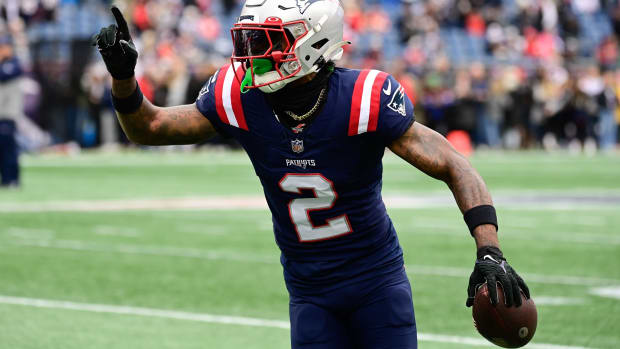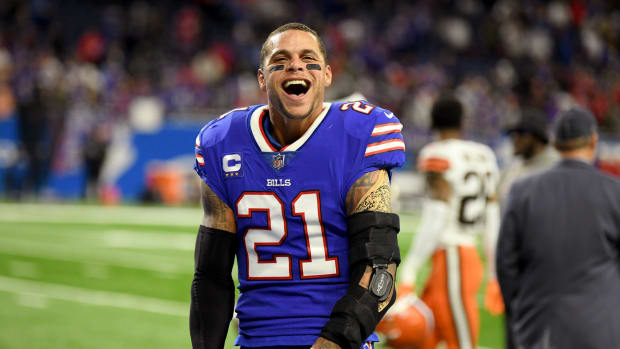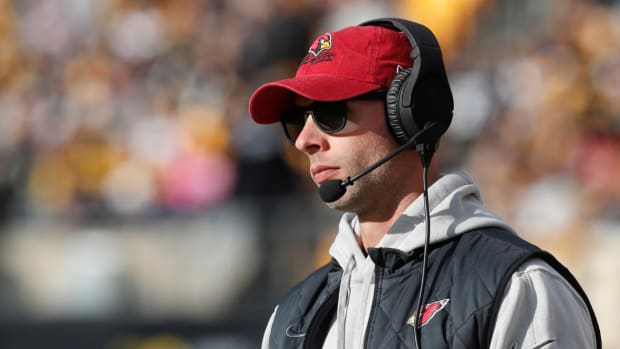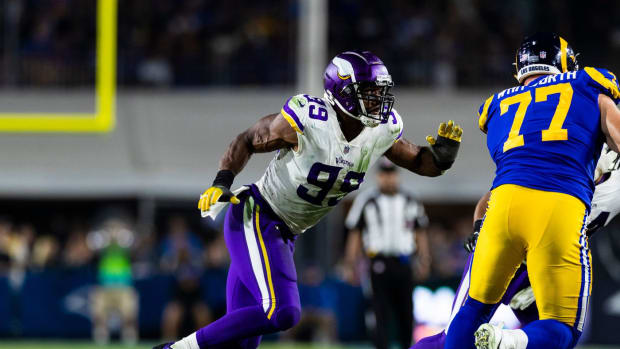NFL Replay Critics: Stop the Obsession, and the Unrealistic Expectations for Officials
We have gotten to a crazy place in football. Crazy. We think that occurrences on the football field that last 0.94 seconds (and I timed it six times—that was the average) and then are slo-moed for hours, Zapruder-like, first on the game telecast and then on the Sunday night highlight shows and then online for hours, can be sensibly dissected and critiqued in real time. It’s just so unrealistic.
I refer to the Myles Jack strip of Patriots running back Dion Lewis in the open field in the fourth quarter of the AFC Championship Game. You’ve seen it. Lewis was running down the left side of the field, at the end of a big gain, when corralled by Jack, who partially stripped the ball from Lewis. In the process of both men going to the ground, the ball was stolen by Jack. Jack rolled over, got up and began to run with the ball—but the play was ruled dead by an official’s whistle on the field.
MMQB reader Sherry R. wrote in to say: “That inadvertent whistle on the stripped fumble cost the Jaguars the game. There was NO WAY the play should have been whistled dead. And Jack would have [run] that back for a TD, no doubt. What do you think?”
This column is about the unrealistic expectations we place on officials. It’s about how officiating has changed, to the point where we think, after watching multimple slow-motion replays, that the official in real time should certainly have seen what we just saw. But we saw the play live, and then in replay, six or eight or 15 times.
My problem with the analysis of the play as it was officiated is simple: From the time Jack contacted Lewis to the time he had clear possession of the ball and was rising from the ground is about a second. And we’re asking officials in real time, to decide in .94 seconds:
• Did Lewis lose possession of the ball when contacted by Jack?
• Did Lewis regain possession of the ball before his knee contacted the ground?
• Did Jack possess the ball as he fell to the ground and rolled over?
• If Jack did possess the ball, was Jack contacted by Lewis as Jack fell to the ground?
If the fourth was the case, the official, either the back judge or side judge, should have blown the whistle. If there was no contact as Jack fell to the ground, he should have been allowed to get up and run with the football. The officials blew the whistle and ended the play.
• HOW TOM BRADY HAS EVOLVED: Andy Benoit on what the Eagles can do to beat the Patriots QB
The call on the field was a fumble and a recovery by Jack. The review confirmed the call. The ruling stood. Jacksonville ball.
The only thing that could be subject to review was the fumble, and who gets possession. Once the whistle has blown on the field, nothing after that matters.
When you look at the call over and over, you can make the credible argument that Jack recovered the ball and rolled over, untouched, and should have been allowed to get up and run with it. If you say the fumble was real, that’s probably true. When you look at it, it’s really close, because there’s a moment when Lewis appears to re-establish possession, but it’s close. Jack with the ball is probably the correct conclusion.
But then, in slo-mo, it looks like Jack is not touched. So why shouldn’t he be able to run with the ball?
Most important words: “in slo-mo.” Imagine officiating that play in real time. While running. That’s the job of the officials on the play.
My feeling is, we’re asking too much of officials. We’re asking them to get 100 percent of the plays correct, and when they don’t, when they blow a play dead, the way they blew this play dead, they have erred. Horribly.
I called former NFL VP of officiating Mike Pereira about where we are with officiating now, and I called him for a reason. He loves officials, but he has shown as an analyst at FOX that he’s not afraid to call them out, or to call out the officiating department, when in his eyes they err.
“That play was incredibly hard to officiate,” Pereira told me on Tuesday. “In a second, the ball is loose, maybe re-possessed, maybe recovered by the other team, and maybe the recovering player was touched as he fell. All in about a second. No one really questioned that in real time, only after watching it over and over again. That’s about the most difficult call an official would have to make.
“But the criticism of that call … Officiating anymore is not realistic. There is no consideration any longer of real-time officiating. You ask 130 officials, and they would tell you that is the most frustrating part of their job. You have to live with it. They make a call in real time, and they’re criticized after people watch replay after replay. The expectations are just amazing. The only level of acceptability is 100 percent.
“Replay and technology has put so much more emphasis on the really tight judgment plays that are so difficult to officiate. The fact is they’re getting more calls right now than they’ve gotten before. Technology magnifies a mistake to a degree where it’s all people want to talk about.”
• MAYFIELD, ALLEN AND THE PROSPECTS TO WATCH: Albert Breer from the Senior Bowl
Recently, former GM Ernie Accorsi watched tape of some games from the ’50 and ’60s. Accorsi 76. Not only did he experience those games via tape, he watched games live as a fan in back then and recalls them differently from today’s football.
“There was a different state of mind then, watching football with no replays,” Accorsi said. “It was like the rub of the green. You complained about officiating, but it was part of the game then. I don’t remember calls I complained about as a fan. I don’t remember, in all those big games I watched—the Colts, the Lions, the Giants—I don’t remember calls when I said, ‘They got robbed.’ You had faith in the officials. You didn’t have replay on TV. You just accepted it.”
I’ve always been a replay advocate—done correctly, and without the micro-managing of today’s replay decisions. But there’s something about yesteryear, and about not obsessing over close calls like the Lewis/Jack split-second decision, that really appeals to me. We’re ruining some of the love of the game by going batcrap over truly close calls that could go either way in real time. We need to stop the obsession.
Now for your email...
• PETER KING: ‘We're going to the stinkin' Super Bowl’: Eagles, Patriots punch tickets for Minnesota
DOES THE PUNISHMENT FIT THE CRIME?
Jacksonville safety Barry Church's knockout blow to Gronkowski in the AFC Championship Game made me wonder if the punishment fit the crime. The Patriots lost their second best player for the rest of the game, while the Jags paid the small price of a 15-yard penalty. A modest proposal: When a defensive player is flagged for an illegal blow to the head that results in the offensive player being forced to leave the game for the concussion protocol, the defensive player must also leave the game. If the offensive player is deemed not able to return to play, the defensive player is disqualified for the remainder of the game. If the NFL truly wants to protect defenseless players, this might add some incentive.
—Morris S., Dallas
That’s an interesting proposal, Morris. I’ll tell you the only way I’d agree with a proposal like this—I’d have to see a clause in the rule that would include the proviso that the offending defensive player be guilty of targeting, or guilty of hitting a player in the helmet with obvious intent. I do not think Church intentionally hit Gronkowski in the head. In the case of questionable intent, as here, it would be unfair (to me) for Church to be removed from the game for hitting Gronkowski if the intent was not there.
BRADY’S OPEN HEART SURGERY
I first heard about the injury while driving to work Thursday morning. The reporter said Brady's hand took four stitches. I probably read or listened to a half dozen more reports from various sources, all adhering to the gospel of four stitches, until Sunday morning. Then one of the pregame show radio hosts said it was 10 stitches. Now the current MMQB says it was 12. Are you sure we won't be talking about Tom Brady's open heart surgery by Wednesday?
—Duke, San Diego
Adam Schefter reported 12 Sunday night. That’s good enough for me.
BAD CALLS
Great MMQB article, Peter. It’s been a hard playoff season (as a Packers fan I have been spoiled seeing Green Bay in the playoffs every year), but while the games have been entertaining, I wanted to ask you about the officiating in the New England-Jacksonville game. The disparity in the number of calls for each team was incredible, and there seemed to be multiple calls against Jacksonville that were questionable and multiple plays against New England that could have been called that weren’t. One of the reasons I stopped being a diehard NBA fan was the way certain teams were favored by calls and others were ignored. Did it not seem like the refs were a severe detriment to Jacksonville while extremely advantageous for New England?
—Bryan W., Spartanburg, S.C.
I didn’t see a call on New England that was missed that I felt was egregious, nor did I see a call on Jacksonville that seemed poor. It’s possible that one team is whistled for five more penalties in a game than the other team without the officiating being poor. Five penalties more for Jacksonville is “incredible?” Man, I didn’t see it that way.
NICK FOLES IS IN HIS PRIME
Peter, given the intense mental demands of the QB position in the NFL, and the amount of repetition required to master, is it really surprising that a guy would just hit his stride at around 30? I wonder how much great QB play has washed out of the league before it got its chance to shine.
—Flanagan, Worcester, Mass.
Interesting. Consider what might have happened if Drew Bledsoe never got knocked out of that game by the Jets in 2001. What if he was an ironman, and what if Tom Brady, for example, left the Patriots in 2005 to go to a quarterback-needy bad team. Houston, let’s say. Or Oakland, or New Orleans pre-Brees and pre-Payton. Maybe Brady would have washed out. You never know. So much of your fate in sports has to do with where you are and when you’re there.
THE PATRIOTS GET ALL THE CALLS
One thing I did not see you cover, and would be interested in your take: Many around the league have a perception that historically New England is the recipient of preferential treatment by the officials. Thoughts?
—Bob, Delaware
I don’t see it. The conspiracy would go too deep if there was this understanding that New England gets the calls. If that’s the case, why did the league kill the Patriots over Spygate, and then ban their most important player for a quarter of the season for Deflategate? That doesn’t fit the profile of a league wanting New England to get all the calls and then advance in the playoffs.
THE RAIDERS AND THE ROONEY RULE
With all due respect, you’re wrong about the Raiders’ interview of Tee Martin being a sham. The sham is the Rooney Rule itself, which says, “Even if you know exactly who you want to hire, if that person is white, you have to make at least one minority feel like he has a chance at the job by interviewing him, because in 2018, minorities need more help than white people.” We live in a world where profit margins demand we hire the best, regardless of race/religion/sexuality/politics/favorite Monopoly token. Thank you for all that you and your staff do to bring us the best NFL column every week.
—Jon M., Currituck, N.C.
Jon, this hire was an outlier. The Raiders have tried to hire Jon Gruden three previous times since the death of Al Davis. But the Raiders made the process a sham by interviewing two minorities ONLY after the organization had made up its mind to hire Gruden. As I wrote Monday, the Raiders should have admitted the truth and then done something fair (I suggested funding 10 minority-coaching fellowships for the 2018 season) to say to coaches everywhere, “We believe in this rule, and we support it, but in this case, we’ve been after Gruden for seven years and we didn’t want to mislead anyone about it.” Instead, the team misled everyone, and the league went along with the sham.
ANGRY YINZERS WEIGH IN
First, I’ll admit that I’m a frustrated Steelers fan with a deep-seated hatred for the Patriots. I agree you can’t argue Belichick/Brady being the best coach/QB ever, but their legacy is still a tarnished one. Historically there’s The Tuck Rule, Spygate, Deflategate, and currently, NFL officials seemingly doing whatever they can to help the Pats win. No team has consistently benefited from questionable calls this season as often as the Patriots. Sincerely, an angry Yinzer.
—Brandon, Pittsburgh
My in-laws are all from Pittsburgh, and I love them dearly. But my late father-in-law was convinced that the league loved the Cowboys (the “Cryboys,” he called them) and hated the Steelers. Such is life. The game is decided on the field, and fans get mad about that sometimes.
THANKS WARRICK DUNN
What a truly wonderful story about the heart of a genuinely beautiful human being. His is an example for all Americans, not the boorish self-centered behavior of so many leaders in our society.
—Rick, Tampa Bay
Thanks for ending the week on a cool note, Rick. Warrick Dunn is the most philanthropic player I have met in 34 seasons covering the NFL.
• We have a newsletter, and you can subscribe, and it’s free. Get “The Morning Huddle” delivered to your inbox first thing each weekday, by going here and checking The MMQB newsletter box. Start your day with the best of the NFL, from The MMQB.
• Question or comment? Story idea? Email us at talkback@themmqb.com.





































